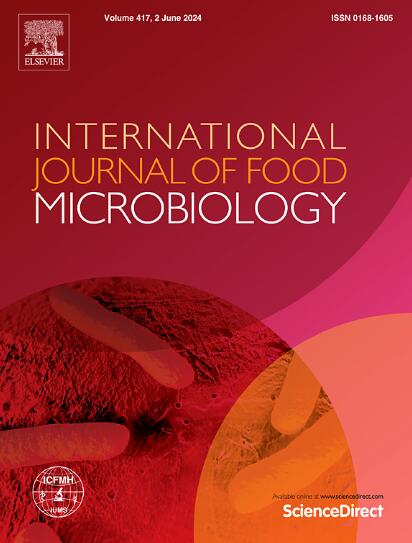Exploring the genetic information of Lactobacillus helveticus strains hydrolyzing soy protein using genome-wide association analysis
IF 5.2
1区 农林科学
Q1 FOOD SCIENCE & TECHNOLOGY
International journal of food microbiology
Pub Date : 2025-04-16
DOI:10.1016/j.ijfoodmicro.2025.111214
引用次数: 0
Abstract
Soy protein is a multimeric globular protein that is less likely to be metabolized and utilized by lactic acid bacteria (LAB) during fermentation compared to milk-derived proteins. Little genetic information is available regarding LAB-mediated hydrolysis of soy protein. In this study, we sequenced the genomes of 46 Lactobacillus helveticus (L. helveticus) strains to analyze genetic-level factors affecting soy protein hydrolytic activity. The analysis revealed that the soy protein hydrolysis capability of these L. helveticus strains showed no correlation with their isolation sources, geographic origins, extracellular protease genes, peptide transporter genes, or peptidase gene distribution. Through genome-wide association analysis (GWAS), we identified two significantly associated missense SNPs (SNP-482062 and SNP-1780770) linked to soy protein hydrolysis activity. These two SNPs changed the local tertiary structure of amino acid permease and ornithine decarboxylase, respectively. Enzymatic assays confirmed that the mutations significantly affected enzyme activity, thereby validating their critical role in soy protein hydrolysis. This study elucidates the genetic basis for differential soy protein hydrolysis capacity among L. helveticus strains, offering practical guidance for selecting highly proteolytic strains to develop soy-based fermented dairy alternatives.
利用全基因组关联分析探索helveticus乳酸杆菌水解大豆蛋白菌株的遗传信息
大豆蛋白是一种多聚体球状蛋白,与乳源蛋白相比,在发酵过程中不太可能被乳酸菌代谢和利用。关于实验室介导的大豆蛋白水解的遗传信息很少。本研究对46株helveticus乳杆菌(L. helveticus)进行了基因组测序,分析了影响大豆蛋白水解活性的遗传水平因素。结果表明,这些helveticus菌株的大豆蛋白水解能力与其分离来源、地理来源、胞外蛋白酶基因、肽转运基因和肽酶基因分布无关。通过全基因组关联分析(GWAS),我们发现了两个显著相关的错义snp (SNP-482062和SNP-1780770)与大豆蛋白水解活性相关。这两个snp分别改变了氨基酸渗透酶和鸟氨酸脱羧酶的局部三级结构。酶分析证实,突变显著影响酶活性,从而验证了它们在大豆蛋白水解中的关键作用。本研究阐明了helveticus菌株之间大豆蛋白水解能力差异的遗传基础,为选择高蛋白水解菌株开发大豆发酵乳制品替代品提供了实践指导。
本文章由计算机程序翻译,如有差异,请以英文原文为准。
求助全文
约1分钟内获得全文
求助全文
来源期刊
CiteScore
10.40
自引率
5.60%
发文量
322
审稿时长
65 days
期刊介绍:
The International Journal of Food Microbiology publishes papers dealing with all aspects of food microbiology. Articles must present information that is novel, has high impact and interest, and is of high scientific quality. They should provide scientific or technological advancement in the specific field of interest of the journal and enhance its strong international reputation. Preliminary or confirmatory results as well as contributions not strictly related to food microbiology will not be considered for publication.

 求助内容:
求助内容: 应助结果提醒方式:
应助结果提醒方式:


